As
I mentioned earlier this week, I won a copy of
Divergent from Kaye at
paper reader. I wasn't planning on posting about
Divergent this weekend. I have lots of to-be-written and to-be-finished posts in my queue and I've posted about two YA dystopians recently
1. But, I read it from start to finish on Friday, staying up way past my usual bedtime to do so, and it's the first time I've done that in quite a while so I figured
Divergent deserved quick treatment.
Divergent by Veronica Roth
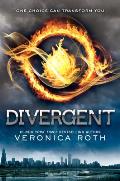 Decades ago our ancestors realized that it is not political ideology, religious belief, race, or nationalism that is to blame for a warring world. Rather they determined that it was the fault of human personality--of humankind's inclination toward evil, in whatever form that is. They divided into factions that sought to eradicate those qualities they believed responsible for the world's disarray. [...] Those who blamed aggression formed Amity. [...] Those who blamed ignorance became the Erudite. [...] Those who blamed duplicity created Candor. [...] Those who blamed selfishness made Abnegation. [...] And those who blamed cowardice were the Dauntless. (42-43)
Decades ago our ancestors realized that it is not political ideology, religious belief, race, or nationalism that is to blame for a warring world. Rather they determined that it was the fault of human personality--of humankind's inclination toward evil, in whatever form that is. They divided into factions that sought to eradicate those qualities they believed responsible for the world's disarray. [...] Those who blamed aggression formed Amity. [...] Those who blamed ignorance became the Erudite. [...] Those who blamed duplicity created Candor. [...] Those who blamed selfishness made Abnegation. [...] And those who blamed cowardice were the Dauntless. (42-43)
Beatrice Prior, who grew up within the self-sacrificing Abnegation faction, has reached the age when she must make the biggest decision of her life. She, like all sixteen-year-olds in her post-apocalyptic Chicago, is evaluated to determine the faction for which she's best suited. While the evaluation results are stored, they do not determine placement. Using the evaluation as guidance, Beatrice must chose with which faction to ally herself. She'll still have to pass her chosen faction's initiation. If she doesn't, she'll spend the rest of her life as a
factionless on the outskirts of society.
On the day of her evaluation, Beatrice is unsure about which faction she'll choose. When her result is anomalous, Beatrice has more questions than before and only one day to make the decision. Beatrice goes with her gut and chooses Dauntless
2 despite the fact that her decision might mean that she'll never see her parents or brother again. The Dauntless initiation is much more intense than Beatrice, who renames herself Tris, imagined and the things she learns during it make her question the status quo.
I really enjoyed
Divergent (I assume that's obvious based on what I posted above) and, while it wasn't perfect, it didn't disappoint me. Readers don't receive any information about what big, apocalyptic event (if any) caused society to break down and reorganize in this way. They also don't learn anything about the world outside of Chicagoland.
3 This didn't bother me too much because it's quite possible given what we do know that the individuals living in Roth's Chicago have no contact with the outside world (if society even exists out there).
At first I thought that
Divergent would have been a stronger novel without Tris' blossoming romance. That it wasn't necessary. That Tris and the other character could have played off each other without their relationship developing into a romantic one. I thought it would have been better to leave this particular romance out or to leave it unstated and/or unrequited until later in the series (because, yes,
Divergent is the first in a series). But then I remembered the final scenes and I'm not sure how some of them would have played out if Tris and the other character hadn't been in love. I guess I'll just say--for the people like me who are tired of the "instalove" often portrayed in YA novels-- that Tris' romance is not quite of that ilk. They don't instantly fall for each other, there is tension, and they have much more in common than either of them realizes.
Tris is a relateable heroine, despite the fact that things sometimes seem too easy for her (and there is actually an explanation for that ease). The society Roth depicts is interesting and different than any other I've read thus far.
Divergent also works well as a first-book-in-a-series. There's world building and the revelation of an overarching storyline, but the novel has a satisfying conclusion. One of the areas in which
Divergent excels is in not getting bogged down in world-building and backstory.
Divergent is fast-paced and full of action. It is a bit heavy on the violence, but I think the story itself is so engrossing that even individuals who are sensitive about violence can push on past those sections.
Insurgent, the sequel to
Divergent will be released in May 2012. It's going straight on my wish list.
- Bumped by Megan McCafferty (see post) and Delirium by Lauren Oliver (see post).
- The encircled flame on Divergent's cover is the Dauntless seal. Though, I think that the stamped version on the hardcover itself is more striking than the burning image on the dust jacket.
- Chicagoland isn't a term used in the book. It's just an informal term for the Chicago metropolitan area. As far as I remember, Roth never names her imagined society.
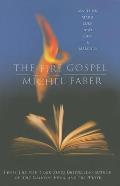
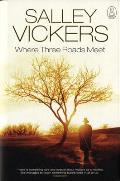

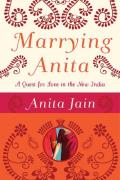 Is arranged marriage any worse than Craigslist? One smart and feisty womans year in India looking for a husband the old-fashioned way reveals a rapidly changing culture and a whole host of ideas about the best way to find a mate.
Is arranged marriage any worse than Craigslist? One smart and feisty womans year in India looking for a husband the old-fashioned way reveals a rapidly changing culture and a whole host of ideas about the best way to find a mate.

 Decades ago our ancestors realized that it is not political ideology, religious belief, race, or nationalism that is to blame for a warring world. Rather they determined that it was the fault of human personality--of humankind's inclination toward evil, in whatever form that is. They divided into factions that sought to eradicate those qualities they believed responsible for the world's disarray. [...] Those who blamed aggression formed Amity. [...] Those who blamed ignorance became the Erudite. [...] Those who blamed duplicity created Candor. [...] Those who blamed selfishness made Abnegation. [...] And those who blamed cowardice were the Dauntless. (42-43)
Decades ago our ancestors realized that it is not political ideology, religious belief, race, or nationalism that is to blame for a warring world. Rather they determined that it was the fault of human personality--of humankind's inclination toward evil, in whatever form that is. They divided into factions that sought to eradicate those qualities they believed responsible for the world's disarray. [...] Those who blamed aggression formed Amity. [...] Those who blamed ignorance became the Erudite. [...] Those who blamed duplicity created Candor. [...] Those who blamed selfishness made Abnegation. [...] And those who blamed cowardice were the Dauntless. (42-43)



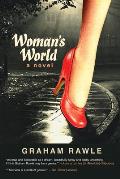

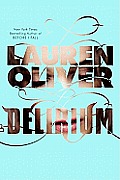 Magdalena Haloway has grown up in a world that considers amor deliria nervosa, or more specifically how individuals infected with the disease act and react, the biggest threat to society. There is a cure, but it's risky to have the procedure performed too early. Boys and girls are segregated to reduce the likelihood of disease contraction in youth. As individuals near their eighteen birthday and cure date, they undergo an evaluation and receive a list of approved matches. Lena is counting the days until her procedure, looking forward to the safety it will provide. That is... until she meets Alex.
Magdalena Haloway has grown up in a world that considers amor deliria nervosa, or more specifically how individuals infected with the disease act and react, the biggest threat to society. There is a cure, but it's risky to have the procedure performed too early. Boys and girls are segregated to reduce the likelihood of disease contraction in youth. As individuals near their eighteen birthday and cure date, they undergo an evaluation and receive a list of approved matches. Lena is counting the days until her procedure, looking forward to the safety it will provide. That is... until she meets Alex.
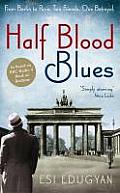 The aftermath of the fall of Paris, 1940. Hieronymous Falk, a rising star on the cabaret scene, was arrested in a cafe and never heard from again. He was twenty years old. He was a German citizen. And he was black. Fifty years later, Sid, Hiero's bandmate and the only witness that day, is going back to Berlin. Persuaded by his old friend Chip, Sid discovers there's more to the journey than he thought when Chip shares a mysterious letter, bringing to the surface secrets buried since Hiero's fate was settled.
The aftermath of the fall of Paris, 1940. Hieronymous Falk, a rising star on the cabaret scene, was arrested in a cafe and never heard from again. He was twenty years old. He was a German citizen. And he was black. Fifty years later, Sid, Hiero's bandmate and the only witness that day, is going back to Berlin. Persuaded by his old friend Chip, Sid discovers there's more to the journey than he thought when Chip shares a mysterious letter, bringing to the surface secrets buried since Hiero's fate was settled. 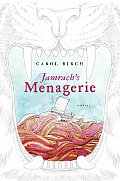
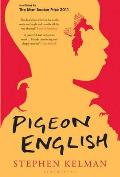 Lying in front of Harrison Opuku is a body, the body of one of his classmates, a boy known for his crazy basketball skills, who seems to have been murdered for his dinner. Armed with a pair of camouflage binoculars and detective techniques absorbed from television shows like CSI, Harri and his best friend, Dean, plot to bring the perpetrator to justice. They gather evidence--fingerprints lifted from windows with tape, a wallet stained with blood--and lay traps to flush out the murderer. But nothing can prepare them for what happens when a criminal feels you closing in on him. Recently emigrated from Ghana with his sister and mother to London's enormous housing projects, Harri is pure curiosity and ebullience--obsessed with gummy candy, a friend to the pigeon who visits his balcony, quite possibly the fastest runner in his school, and clearly also fast on the trail of a murderer. Told in Harri's infectious voice and multicultural slang,
Lying in front of Harrison Opuku is a body, the body of one of his classmates, a boy known for his crazy basketball skills, who seems to have been murdered for his dinner. Armed with a pair of camouflage binoculars and detective techniques absorbed from television shows like CSI, Harri and his best friend, Dean, plot to bring the perpetrator to justice. They gather evidence--fingerprints lifted from windows with tape, a wallet stained with blood--and lay traps to flush out the murderer. But nothing can prepare them for what happens when a criminal feels you closing in on him. Recently emigrated from Ghana with his sister and mother to London's enormous housing projects, Harri is pure curiosity and ebullience--obsessed with gummy candy, a friend to the pigeon who visits his balcony, quite possibly the fastest runner in his school, and clearly also fast on the trail of a murderer. Told in Harri's infectious voice and multicultural slang,  Tony Webster and his clique first met Adrian Finn at school. Sex-hungry and book-hungry, they navigated the girl drought of gawky adolescence together, trading in affectations, in-jokes, rumour and wit. Maybe Adrian was a little more serious than the others, certainly more intelligent, but they swore to stay friends forever. Until Adrian's life took a turn into tragedy, and all of them, especially Tony, moved on and did their best to forget.
Tony Webster and his clique first met Adrian Finn at school. Sex-hungry and book-hungry, they navigated the girl drought of gawky adolescence together, trading in affectations, in-jokes, rumour and wit. Maybe Adrian was a little more serious than the others, certainly more intelligent, but they swore to stay friends forever. Until Adrian's life took a turn into tragedy, and all of them, especially Tony, moved on and did their best to forget.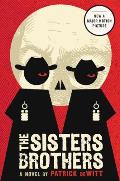 Hermann Kermit Warm is going to die. The enigmatic and powerful man known only as the Commodore has ordered it, and his henchmen, Eli and Charlie Sisters, will make sure of it. Though Eli doesn't share his brother's appetite for whiskey and killing, he's never known anything else. But their prey isn't an easy mark, and on the road from Oregon City to Warm's gold-mining claim outside Sacramento, Eli begins to question what he does for a living – and whom he does it for.
Hermann Kermit Warm is going to die. The enigmatic and powerful man known only as the Commodore has ordered it, and his henchmen, Eli and Charlie Sisters, will make sure of it. Though Eli doesn't share his brother's appetite for whiskey and killing, he's never known anything else. But their prey isn't an easy mark, and on the road from Oregon City to Warm's gold-mining claim outside Sacramento, Eli begins to question what he does for a living – and whom he does it for.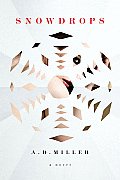 Nick Platt is a British lawyer working in Moscow in the early 2000s—a place where the cascade of oil money, the tightening grip of the government, the jostling of the oligarchs, and the loosening of Soviet social mores have led to a culture where corruption, decadence, violence, and betrayal define everyday life. Nick doesn’t ask too many questions about the shady deals he works on—he’s too busy enjoying the exotic, surreally sinful nightlife Moscow has to offer.
Nick Platt is a British lawyer working in Moscow in the early 2000s—a place where the cascade of oil money, the tightening grip of the government, the jostling of the oligarchs, and the loosening of Soviet social mores have led to a culture where corruption, decadence, violence, and betrayal define everyday life. Nick doesn’t ask too many questions about the shady deals he works on—he’s too busy enjoying the exotic, surreally sinful nightlife Moscow has to offer.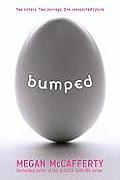 I'd been wanting to read
I'd been wanting to read 
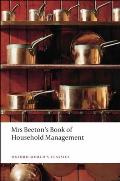 Isabella Beeton (nee Mayson) was the Martha Stewart of her day2 and
Isabella Beeton (nee Mayson) was the Martha Stewart of her day2 and